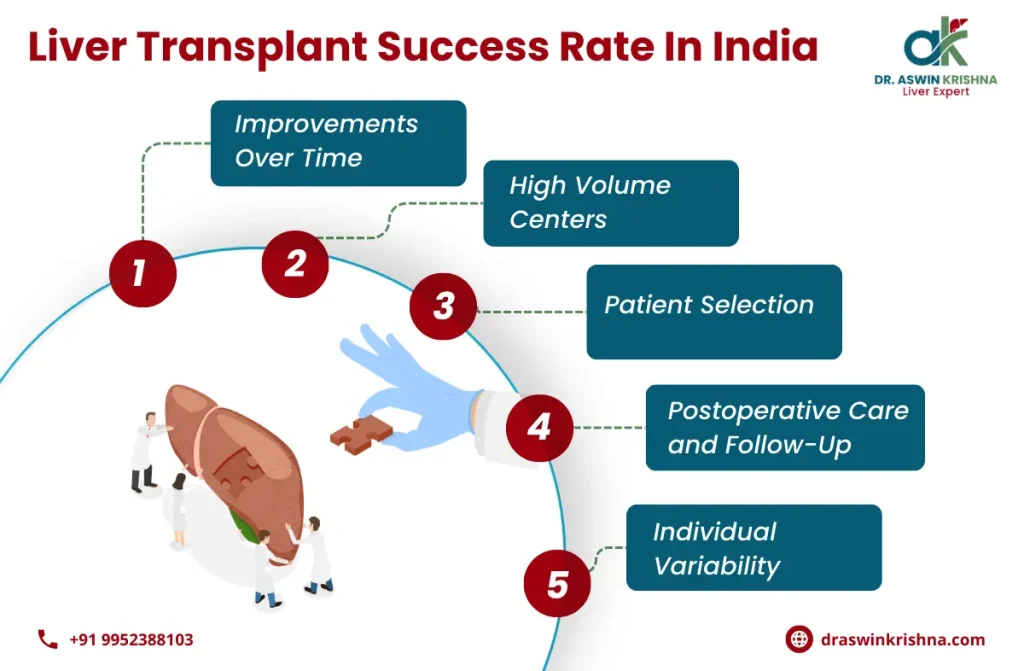Liver transplantation is a complex yet life-saving procedure for patients with end-stage liver diseases or acute liver failure. Over the years, India has become a global destination for liver transplants, thanks to advanced medical technology, skilled surgeons, and relatively affordable treatment costs. In this article, we explore the Liver Transplant Success Rate in India by covering essential aspects like success factors, statistics, and the recovery process.
Understanding Liver Transplants
A liver transplant is a surgical procedure in which a diseased liver is replaced with a healthy liver from a donor. It is typically considered when the liver is no longer functional due to chronic conditions such as cirrhosis, hepatitis, or liver cancer. Transplants are either from living donors, where a portion of the liver is transplanted, or from deceased donors, where the entire liver is used. Due to the liver’s remarkable ability to regenerate, even partial transplants can be highly effective.
Success Rates of Liver Transplant
India is recognized globally for its expertise in performing successful liver transplants. The Liver Transplant Success Rate in India varies depending on several factors, but overall, it ranges between 85% and 90% in the first year after surgery. The Liver Transplant Survival Rate in India is also among the highest in the world, with long-term survival rates extending beyond 80% for five years post-transplantation.
Some key statistics include:
- First-year survival rates: 85-90%
- Five-year survival rates: 75-80%
- Pediatric liver transplant success rates: 90-95%

The Reason for Liver Transplants
The Success of Liver Transplant Surgery in India lies in its ability to extend life expectancy and improve the quality of life for patients with severe liver conditions. Liver transplants are recommended when the liver has suffered irreparable damage, and without a transplant, the patient’s life expectancy is severely reduced. The rationale is that a functional liver is critical for various bodily processes, including detoxification, protein synthesis, and digestion.
For patients suffering from conditions like liver cirrhosis, acute liver failure, or primary liver cancer, a transplant becomes the only viable treatment option. Timely intervention significantly boosts the Liver Transplant Success Rate in India, enabling patients to regain normal life functions.
Success Rates by Age
The Liver Transplant Survival Rate in India differs by age group, as age-related factors such as immunity, comorbidities, and organ regeneration capabilities come into play.
- Children (0-18 years): Children tend to have the highest success rates due to their strong regenerative capacity. Pediatric liver transplant success rates in India are as high as 90-95%.
- Adults (18-50 years): Adult patients also show high success rates, typically ranging from 85-90% in the first year.
- Elderly (above 50 years): While liver transplant surgeries are still successful in elderly patients, the Success of Liver Transplant Surgery in India in this group tends to be lower due to age-related factors, typically between 75-80%.
Factors Influencing Success Rate
Several factors influence the Liver Transplant Success Rate in India:
- Timely diagnosis: Early detection and timely transplantation play a crucial role in the success of the surgery.
- Health of the donor organ: The quality and compatibility of the donor organ significantly affect the outcome.
- Post-transplant care: Proper immunosuppressive medication and infection prevention are essential for ensuring long-term success.
- Underlying medical conditions: Patients with coexisting conditions such as diabetes, heart disease, or obesity may have lower success rates.
- Age and general health: Younger patients and those without severe comorbidities tend to have higher survival rates after a liver transplant.
Recovery Process after a Liver Transplant
The recovery process after a liver transplant is divided into several stages, each crucial to achieving a successful outcome. Here’s an overview:
Immediate Post-Surgery (First Week)
- Patients remain in the intensive care unit (ICU) for 3-5 days for close monitoring.
- Medications are administered to prevent organ rejection and fight infections.
- Most patients can start walking within a week post-surgery.
Early Recovery (First 3 Months)
- Regular follow-ups are scheduled to monitor liver function and overall recovery.
- Immunosuppressant drugs are prescribed to prevent the body from rejecting the new liver.
- Patients must follow a strict diet and avoid heavy physical activity.
Long-Term Recovery (6-12 Months)
- After 6 months, patients can gradually return to normal activities, including work.
- Lifestyle changes, including a healthy diet and avoiding alcohol, are crucial for maintaining liver health.
- Regular health checkups continue to ensure there are no complications.
Full Recovery (Beyond 1 Year)
- By the end of the first year, the liver fully integrates into the body, and patients enjoy improved quality of life.
- At this stage, the survival rate after liver transplant in India stabilizes, with minimal risk of complications if proper post-transplant care is followed.
Liver Transplant Success Rate in India
Liver transplantation in India has seen remarkable success due to the involvement of highly skilled specialists and advanced medical facilities. The success rate has significantly improved, reaching approximately 85-90% one-year survival rate post-transplant.
Key Specialists Involved in Liver Transplantation:
- Hepatologist Specialist: Manage liver diseases and patient evaluations.
- Transplant Surgeons: Perform the intricate liver transplant surgery.
- Anesthesiologists: Ensure safe anesthesia during surgery.
- Radiologists: Assist with imaging and diagnostics.
- Pathologists: Conduct biopsy analyses to check for liver disease.
- Nurses and Coordinators: Provide pre and post-operative care and patient support.
Why is a Liver Transplant Done?
A liver transplant is often advised for individuals suffering from end-stage liver disease when their condition is life-threatening and other treatments have failed. Without a liver transplant, these individuals are at high risk of mortality. It becomes a crucial intervention for those with chronic liver disease or experiencing rapid liver failure.
Primary Reasons for Liver Transplants
- Liver Cirrhosis: The leading cause of liver transplants in adults, characterized by the replacement of healthy liver tissue with scarred tissue. Causes of cirrhosis include:
- Alcohol abuse
- Autoimmune hepatitis
- Biliary atresia (a liver disease in newborns)
- Chronic hepatitis B or chronic hepatitis C
- Nonalcoholic fatty liver disease
- Metabolic disorders
Factors Considered for Liver Transplant Eligibility
- Severity of Condition: How advanced the liver disease is and its impact on the patient’s health.
- Other Medical Conditions: Any existing health issues that might affect the transplant’s success.
- Medical History: Previous illnesses, especially those like tuberculosis or chronic infections such as HIV.
- Overall Physical Health: General health status and the ability to endure the transplant surgery.
- Mental Well-being: Psychological readiness and stability to undergo the procedure.
- Support System: Availability of family or friends to provide post-operative care and emotional support.
Before recommending a liver transplant, doctors evaluate the potential for the surgery to be successful and extend the patient’s life. Candidates with chronic conditions that might compromise the success of the transplant may not be deemed suitable for the procedure.
What to Expect Before a Liver Transplant Surgery?
1. Comprehensive Evaluation: Before a liver transplant, patients undergo a thorough evaluation by a multidisciplinary team of specialists. This assessment includes blood tests, imaging studies, and a complete physical examination to ensure the patient is an ideal candidate for the procedure. The evaluation helps to determine the patient’s overall health and the likelihood of a successful outcome.
2. Preoperative Counseling: Patients and their families are given detailed counseling to explain the entire liver transplant process, risks involved, and postoperative care. It’s vital to discuss the Liver Transplant Success Rate in India, which is promising due to the presence of advanced medical infrastructure and experienced surgeons.
3. Medical Preparation: Patients may need to follow specific medical guidelines before surgery, including dietary restrictions, lifestyle changes, and medication adjustments. If necessary, treatments to stabilize liver function are administered before the transplant surgery.
4. Waiting for a Donor: The transplant can only take place when a suitable donor is available. Donors can either be deceased or living, and their compatibility is crucial for the surgery’s success. While waiting, patients are advised to maintain optimal health to increase the likelihood of a successful procedure.
What to Expect During a Liver Transplant Surgery?
1. Surgical Procedure: During the liver transplant, the diseased liver is carefully removed and replaced with a healthy donor liver. The surgery typically lasts between 6 to 12 hours, depending on the complexity of the case. Surgeons will make an incision in the abdomen, detach the liver from its surrounding structures, and replace it with the donor organ.
2. Use of Advanced Techniques: India is known for its advanced surgical techniques, including minimally invasive procedures and robotic surgery in select cases. These innovations have contributed to the high Liver Transplant Success Rate in India, making it a preferred choice for many international patients.
3. Monitoring During Surgery: Throughout the procedure, the patient’s vital signs, including heart rate, blood pressure, and oxygen levels, are closely monitored to ensure a stable condition. Additionally, the transplant team ensures that the donor liver is functioning optimally before completing the surgery.
4. Immediate Post-Surgical Care: After the transplant, patients are moved to the intensive care unit (ICU) for close observation. This phase is critical, as the medical team monitors for any signs of organ rejection or complications. The Liver Transplant Success Rate in India continues to improve due to the expert postoperative care provided by skilled healthcare professionals.
Diet and Nutrition
Boost Your Beverage Choice:
- Coffee and Green Tea: Both are known for their protective effects against liver fibrosis.
Incorporate Tart Fruits:
- Grapefruit, Cranberries, and Apples: These fruits help in cleansing the liver.
Focus on Green Leafy Vegetables:
- Cabbage, Broccoli Sprouts, Spinach, Arugula, and Dandelion Greens: Act as natural detoxifiers, absorbing toxins from the bloodstream.
- Garlic and Beetroot: Known for their liver-cleansing properties.
Select Healthy Fats and Proteins:
- Walnuts, Avocados, Almonds: Support liver health by managing fat levels.
- Oatmeal: A nutritious grain that aids in liver function.
Opt for Beneficial Oils:
- Olive Oil: A healthy fat that enhances liver function by reducing fat accumulation.
Conclusion
Liver Transplant Success Rate In India has seen significant strides, reflecting the collective efforts of skilled medical professionals and advancements in surgical techniques. Gastroenterology Doctors in Chennai contribute substantially to this success story, ensuring optimal patient care and positive outcomes. If you or your loved ones are considering liver transplantation, trust the expertise and guidance of Gastroenterology Doctors in Chennai for a journey towards renewed health.
Read also Liver Transplant Doctors in Chennai.



